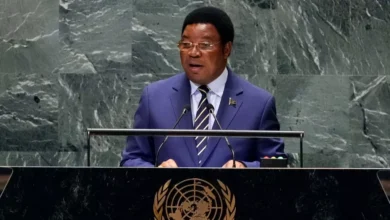
South Africa is navigating a complex situation as significant rifts within the coalition government have emerged regarding the national budget, which has finally been presented after a month-long delay.
Analysts express concern following Finance Minister Enoch Godongwana’s budget proposal, which has faced criticism from various factions, including key coalition partners who have rejected his suggestions for the second time.
The African National Congress (ANC) established a government of national unity (GNU) with nine other parties after losing its parliamentary majority in last year’s elections.
Without the support of its largest coalition partner, the Democratic Alliance (DA), the government risks failing to pass the budget unless it revises its controversial policies or secures backing from major opposition parties.
Godongwana had to delay his budget presentation last month due to strong opposition to his plan to increase value-added tax (VAT), which would have raised the prices of goods at a time when South Africans are already struggling with a cost-of-living crisis.
This postponement caused significant concern across the nation, marking the first such occurrence since the end of apartheid in 1994.
After a series of discussions among the coalition parties, Godongwana returned on Wednesday to unveil what he described as a “bold and pragmatic” budget.
In his revised proposal, the minister aimed to satisfy his GNU partners by announcing a scaled-back VAT increase to be implemented over two years.
Initially, Godongwana proposed raising VAT from 15% to 17%, but he has now adjusted this to a two-step increase to 16%.
The minister argues that tax increases are essential to address ongoing financial pressures in sectors such as health, education, transport, and security.
Godongwana’s updated budget has garnered backing from his party, the ANC, yet it has not satisfied the DA, which stated it would not endorse any tax increases unless they were temporary and accompanied by significant reforms from the ANC aimed at stimulating economic growth, minimizing waste, and generating jobs within the next three years.
This stalemate has marred President Cyril Ramaphosa’s previously celebrated image as a negotiator, with only one of his coalition allies—the minor Patriotic Alliance (PA)—expressing support for the budget.
The ongoing conflict underscores the growing rifts within the fragile coalition government, as the two largest parties have been at odds over critical issues since its inception.
One contentious issue is a land law that permits the government to expropriate private property in specific circumstances without compensating the owners.
The DA is contesting this law in court, claiming it is unconstitutional and poses a threat to property rights in South Africa.
Additionally, the two main opposition parties—Umkhonto weSizwe (MK), associated with former President Jacob Zuma, and Julius Malema’s Economic Freedom Fighters (EFF)—have also rejected the budget, arguing that the proposed tax increases would disproportionately affect the poor.
This situation places the ANC in a challenging position, as it requires the support of at least one of the three other major parties to successfully pass the budget.
Thokozile Madonko, an analyst at Wits University in South Africa, notes that the budget deadlock has placed the country in “uncharted waters.”
She informs the BBC that the role of parliament will be “absolutely critical” in deciding whether to accept, amend, or reject the budget.
Historically, the ANC could easily implement its policies, but that is no longer the case. This scenario will compel the party to negotiate with other factions or risk the budget being defeated, which could lead to the collapse of the coalition government.
Other parties must make a critical decision: should we close schools, hospitals, or clinics? This is a choice they need to confront. Should we resort to layoffs? These are the difficult decisions we face, and they are not favorable options, stated Godongwana.
The minister explained that he chose to increase VAT instead of raising personal and corporate taxes, as the latter would yield less revenue and could negatively impact investment, job creation, and economic growth.

Godongwana has traditionally been viewed as a reliable leader, earning respect from both the business community and labor unions
Ms. Madonko criticized Godongwana for opting for what she termed the “easiest solution” by suggesting a VAT hike that would burden the entire population, rather than implementing a “wealth tax” targeting the wealthiest individuals.
Another expert, Adrian Saville, described the budget as a “folly,” noting that the minister reiterated many previous commitments to stimulate economic growth and reduce unemployment, which currently exceeds 30%.
“Those are just words. Provide us with the figures and outline your plans so that when we reconvene in a year, we can assess whether you have succeeded or fallen short,” he remarked to the BBC.
Godongwana has traditionally been viewed as a reliable leader, earning respect from both the business community and labor unions. However, his credibility has been undermined by the recent budget crisis. He now faces the task of restoring his reputation by successfully navigating the budget through parliament, or he risks increasing scrutiny regarding his fitness for the role.



